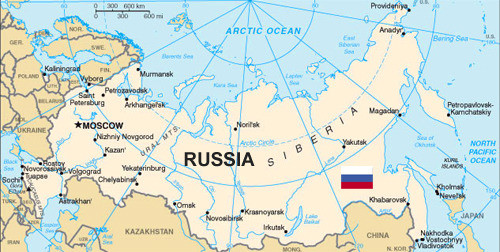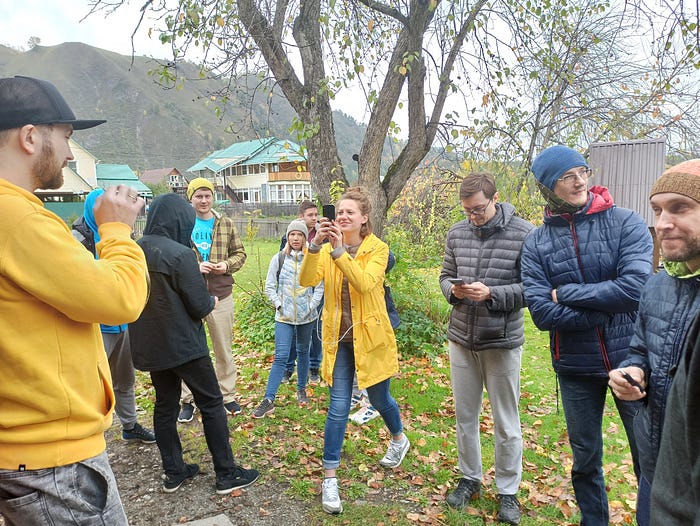What Do Siberian Millennial and the Perestroika Generation Professionals Have in Common?

Subject: What Do Siberian Millennial and the Perestroika Generation Professionals Have in Common?
Date: Thu, 8 Oct 2020
From: Sarah Lindemann-Komarova <echosiberia@gmail.com>
What Do Siberian Millennial and the Perestroika Generation Professionals Have in Common?
By Sarah Lindemann-Komarova
[Sarah Lindemann-Komarova has been a community development activist in Siberia since 1992]
With photos: medium.com/@ECHOSiberia/what-do-siberian-millennial-and-perestroika-generation-professionals-have-in-common-ff4a74fc7658

After a six hour drive, the designer cocktail for the evening was Lynchburg Lemonade (heavy on the Jack Daniels) along with white wine and beer. This followed a take out pizza dinner and prosecco toasts. These 12 programmers, data scientists, and managers (3 women and 9 men) work for the largest financial services company in Siberia. Fresh air and nature on the banks of the Katyn River in Altai. Tomorrow a walk on the river bank, evening tequila cocktails and dancing to tunes on demand from Alisa (Russian Yandex Siri). The day after that, a ski lift to the top of the mountain and hike back, banya, shashlik, Jagermeister, wine spritzers, and Mafia. One of the guests brought a hookah. Everyone pitched in to prepare the meals that included French toast for breakfast, pumpkin soup for lunch, and plov for dinner. None of these Siberian professional millennials got crazy stupid drunk. These young, 25 -32 year olds know they have the knowledge and skills to work anywhere in the world. Machine Learning, Data Science, good, “white” salaries, mortgages, and cars.
The absence of vodka triggered memories of how the previous generation experienced this period in the 90’s. The Perestroika Generation and life after university graduation, young adulthood, the start of a career, and family. “Just imagine the whole ship that you are on is disintegrating? What do you expect from life?” That is how Yarick, a Harvard PhD academic in linguistics, described it. “What I remember is I was not anxious about the future. We didn’t talk about the shitty, shitty situation we were in. We talked about interesting things. What was the point of complaining?” Parties took place in one room flats with 10 people smoking in the kitchen, 15 people in the one room, and 5 more out on the balcony. The only alcohol available was crappy beer, vibrant colored liquors from Germany, and vodka but the drinks menu never went beyond straight shots of vodka from un-capable bottles. It was cheap and the fastest way to distance yourself from a world that was totally out of your control. Yarick could not remember what people ate but had total recall of the contents of a block long food store in 1992, “It was totally empty except for Turkish tea. Nothing but this Turkish dirt that they arranged in pyramids”. Music was mostly western but there was always time for the Russian hero Tsoi and almost always it was “Pack of Cigarettes”:
And no one wants to be guilty for a crime they didn’t commit.
And no one wants to do someone else’s dirty work…
But if I’ve got a pack of cigarettes in my pocket,
Then today won’t be so bad after all…
Yarick was one of the lucky ones he had language skills. Initially, he taught at the University, “I don’t think I even bothered picking up my salary, it was peanuts”. This was supplemented by teaching at a private language school, “a deathtrap exploiter extraordinaire”. Financial salvation came by way of Western projects. His first was as a translator for a US company building houses for coal miners in the Kuzbass. One week on, one week off, no houses ever got built. Next came an EU project translating for an Irishman. The goal was to create producer marketing groups. Instead of the anticipated small farms that would be interested in cutting costs, there were still mostly large state farms. “The reality in the textbooks were defied here. It was a ridiculous job, going to villages, translating, and drinking vodka”. Yarick described his bosses regime, “He would go out and party from 6PM until 1AM. So, the first half of the day he was toughing it out, feeling better and better as the day went on so he was ready to start partying again by evening”. No producer marketing groups were created.
There were other more productive and interesting daily gigs with western projects. In the spring of 1998 Yarick got a full-time translating job at a Russian programming company, “It was soul crushing but I had a son, my life was finished, what are you going to do?” In August, the crappy but still floating ship that Yeltsin built with debt and a lot of Western expertise sank. “Not only did I hate the job, I lost the job” he paused and added “I lost all my camels “comparing himself to the Biblical Job. He explained, “Job was a righteous man and God loved him. Satan said ‘of course you love him, wife, child, camel, start taking these things away from him and you will see who he really is’. And so he did. The camels were the last to go”.
Despite all the middle to upper-middle class trappings, the camels, of these weekending Millennials, they were not spoiled. Half of them come from small cities or villages with working class parents. Six are married and four have children, a lot to tempt Satan on a global spree that values money above of all else. I asked them what about a job was most important. The people you work with, the team, was number one for all but one who said it was opportunities to grow. The project was a solid number two and salary was number three practically tied with growth opportunities. Less important were atmosphere, location, prestige, flexible schedule, and, in a distant last place, medical insurance. Of those who had a vision for their professional future, four planned to stay in Siberia, for two Siberia was on their list, and three wanted to leave. For one of the leavers the future is Moscow or St. Petersburg, another it is Europe, Moscow, or Peter, and one is aiming for the US.
A clear vote of confidence in the future for Siberia and Russia, what were their political leanings? Of those who expressed an opinion, four are proud of their country, one is not, and three are neutral. Five said Russia was on the path to democracy and one said it was “following its own path”. Six are not happy that Putin can serve another two terms and three are ok about it. Seven think Russia and the US are both guilty for the current tense relationship and one says the US alone is at fault. Six people vote all the time, two sometimes, and one never votes. In response to what political party or force best represents their position, six said none of them, two Navalny, and one is a supporter of the nationalist, socially conservative LDPR party. It is notable that the extreme diversity of opinions among the group, like the extreme situation facing Yarick and his peers, did not get in the way of a good time.
In addition to the transcendent ability to party, three things unite the Millennials in Altai and Yarick’s Perestroika Generation: their host (although he limited himself to 0.0 Heineken), the dissonance between how their lives are being experienced and how it is being portrayed in the West, and Queen.
There are plenty of ways that you can hurt a man
And bring him to the ground
You can beat him, you can cheat him
You can treat him bad and leave him when he’s down
But I’m ready, yes, I’m ready for you
I’m standing on my own two feet
Then and now, no one sits still to “Another One Bites the Dust”.
